Civil Liberties, Civil Rights, worker's rights
Podcast: Play in new window | Download
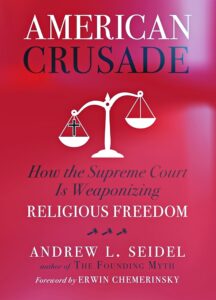
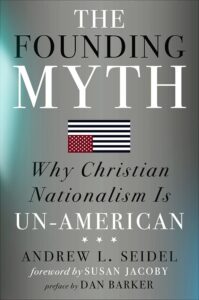
Emphasis On Christian Nationalism
Several recent developments in the United States have highlighted an increased emphasis on Christian Nationalism within government policies, raising concerns about the separation of church and state and its impact on daily life.
This heretical form of Christianity is being forced upon us. It is super masculine, misogynist, nationalist, homophobic, white, supremacist, and racist. It is Christian in name only. The religion of egalitarian Jesus, who preached the values of the sermon on the mount, is not their religion. The Christian nationalists want to use the power of the state to impose on us their brand of Christianity. It is not the solidarity of humankind.
In February 2025, Donald Trump signed an executive order creating the White House Faith Office. This office aims to strengthen partnerships between the federal government and faith-based organizations, enabling them to compete for federal funding and collaborate on initiatives addressing social issues. The order underscores the administration’s recognition of the significant role these organizations play in community development.
Also in February 2025, Trump announced the formation of a task force dedicated to eliminating what he termed “anti-Christian bias” within the federal government. This initiative involves a comprehensive review of federal agencies to identify and address policies or practices perceived as discriminatory against Christians. The task force’s mandate includes ensuring that faith-based organizations receive equal treatment in government programs and services.
The appointment of Russell Vought as the head of the Office of Management and Budget has raised concerns among critics. Vought, known for his Christian nationalist views, has been instrumental in shaping policies that integrate Christian principles into governance. His influence is evident in initiatives that seek to align federal policies with specific religious values, potentially affecting the secular nature of government operations.
Guest – Andrew Seidel, author and attorney who’s defended the First Amendment for more than a decade, both in and out of court. Andrew dedicated his career to challenging religious privilege and battling Christian Nationalism.
—-

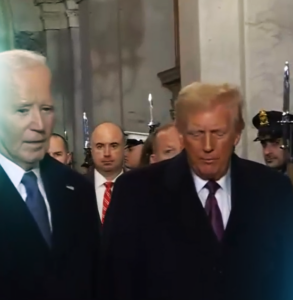
A Golden Age of Oligarchs
Last month, Elon Musk said something about the Trump election with which we agree. He said “this was no ordinary victory. This was a fork in the road of human civilization.“ How true. Now our democracy, however, restricted by class and race, is in the process of being replaced by a super wealthy oligarchy. There are more than 800 billionaires in the United States. They are now in the saddle.
The Citizens United Supreme Court case of 2010 eased the process. Trump was elected with money, truly big money from 10 people. Elon Musk alone contributed $277 million. Biden himself in his farewell address warned of the takeover by an oligarchy. Echoing President Eisenhower‘s famous warning of a military industrial complex, Biden talked about the “tech industrial complex.“
This second Trump term will not be like the first. It won’t be incoherent and chaotic. This has been guaranteed by the Heritage Foundation which wrote a 920 page playbook for dismantling democracy.
The process has begun with Trump pulling out of the Paris Climate Accord and calling for more drilling. “Drill baby drill” is his mantra. This is a race towards human extinction. On January 21st he pulled out of the World Health Organization. The day he was sworn in he pardoned some 1500 people who participated, and even lead the January 6th insurrection. This is a greenlight for fascist mobs who now must feel they can get away with anything.
The Democratic Party has greased the skids for this transition. It cannot be relied on for the defense of the American people. Biden and Harris after accurately calling Trump a fascist to the last few weeks of the election, then did an about face welcoming him in to the White House saying they would cooperate with him and praising the peaceful transition, a transition that Trump if he lost promised not to abide by.
Guest – Chris Hedges, the journalist and author spent two decades as a foreign correspondent serving as the Middle East Bureau Chief and Balkan Bureau Chief for The New York Times where he was awarded the Pulitzer Prize. He is the author of 14 books including War is a Force That Gives us Meaning, Days of Destruction, Days of Revolt, which he co-wrote with the cartoonist Joe Sacco, and The Death of the Liberal Class. Chris’ forthcoming book is titled A Genocide Foretold.

————————————-
Academic Freedom, Civil Liberties, Civil Rights, Executive Branch Law Breaking, Human Rights
Podcast: Play in new window | Download
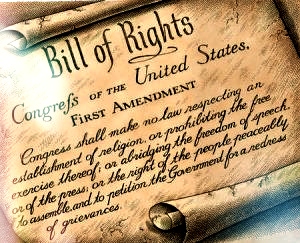
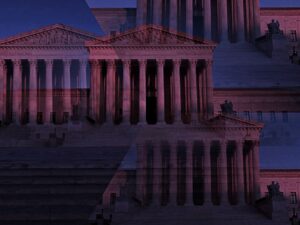
Lawyers Defending American Democracy
The early days of the Trump administration have ushered in a series of assertive executive orders that are rapidly reshaping the federal landscape. While new administrations typically bring change, most Americans expect such shifts to respect the rule of law. Project 2025, however, diverges from legal norms, challenging birthright citizenship, dismantling crucial federal agencies like USAID without congressional approval, and attempting to criminalize support for lawful diversity and anti-bias initiatives.
Today’s guest is Lauren Stiller Rikleen, Executive Director of Lawyers Defending American Democracy. She argues that the media has inadequately covered the full scope of Project 2025’s goals. While the boldness of presidential actions has shocked many, these plans were outlined in the Project’s Mandate for Leadership. Trump’s executive orders threaten protections for workers and marginalized communities and undermine checks and balances that ensure government accountability.
Through these executive orders, the administration is unabashedly aligning the government with conservative ideals at the expense of civil rights and environmental protections. Presidential power is being centralized while erasing decades of legal safeguards against discrimination and environmental harm.
Guest – Lauren Stiller Rikleen is author of four books and editor of the 2023 anthology Her Honor—Stories of Challenge and Triumph from Women Judges, she is also an active member of the American Bar Association. She serves as vice-chair of the Advisory Commission to the Task Force on American Democracy, vice-chair of the Advisory Council to the DEI Center, and co-chair of the Women’s Caucus.
—-

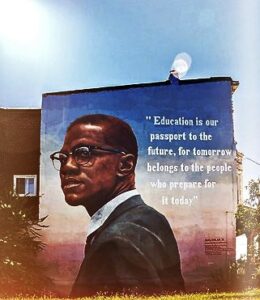
Trump Executive Orders Dismantle DEI, Critical Race Theory
We are experiencing Donald Trump has launched his second term as President with an avalanche of Executive Orders as part of a calculated Shock and Awe strategy to take over the federal government in defiance of the Constitution, Congress, and maybe even the Supreme Court. One of the most dangerous aspects of that scheme is his plan to dismantle well-established programs and policies that encourage Diversity, Equity, and Inclusion, known as DEI, in American society in general and in education in particular; to ban the teaching of Critical Race Theory; and to either totally eliminate the Department of Education or at a minimum strip it of its key functions and funding.
The Department of Education was established by an Act Congress in 1979, signed by President Jimmy Carter. The Department of Education says its elementary and secondary programs serve more than 50 million students in about 98,000 public schools and 32,000 private schools. It also provides grants, loans, and work-study assistance to more than 12 million post-secondary students.
According to Becky Pringle, the president of the National Education Association, Trump’s expected Executive Order to abolish the Department of Education, if it becomes a reality, “would steal resources from the most vulnerable students, explode class sizes, cut job training programs, make higher ed more expensive and out of reach for middle class families, take away special education services for students with disabilities, and gut student civil rights protections.”
A bill has been introduced in the House of Representatives to eliminate the Department of Education, though since it would require 60 votes in the U.S. Senate to do so, it is unlikely to pass.
Christopher Rufo, a Senior Fellow at the conservative Manhattan Institute, writing in its publication, City Journal, spells out rather clearly why the Right is so determined to shut the department down. After pointing out the areas of its work, Rufo says it engages in “ideological production, which includes an array of programs, grants and civil rights initiatives, and third-party NGO’s that create left-wing content to push on local schools.” And he refers to the Department of Education over-all as “a hotbed of left-wing ideologies.”
Trump has yet to issue his Executive Order on this matter, but he’s already said he wants to put the Department of Education out of business, and transfer some of it duties to other departments.
And so today we spend our entire hour looking at the legality of Trump’s plans to target DEI, Critical Race Theory and the Department of Education and, if he is successful, what will be lost and what it is likely to mean for the state of education in America.
Guest – Stephen Rohde is a civil rights activist, author, and constitutional scholar. He practiced civil rights law for almost 50 years. He currently serves as chair of the Interfaith Communities United for Justice and Peace (aka ICUJP), which was formed in the wake of 9/11 for the purpose of organizing faith-based communities to call for an end to war and violence. He is also a past President of the ACLU Foundation of Southern California, and past Chair of Death Penalty Focus, and Bend the Arc: A Jewish Partnership for Justice. Despite that long list of affiliations, today he’s not speaking on behalf of any of those organizations.

——————-
Civil Liberties, Civil Rights, Human Rights, Truth to Power
Podcast: Play in new window | Download
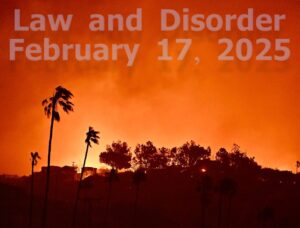

Dismantling Progress, Deportation And Sanctuary Cities
On Law and Disorder, we’re celebrating Black History Month. We remember and honor the ongoing struggle of Black Americans and their allies to achieve equality, justice and fairness. But the forces of white supremacy have opposed that struggle at every turn. Today, the President of the United States and his enablers are at the forefront of not only dismantling the progress that has been made but creating new obstacles to impede further progress.
On day one, Trump claimed to end birthright citizenship and he terminated Diversity, Equity and Inclusion policies and programs throughout the federal government and in companies with federal contracts. He has stepped up deportations and is sending undocumented immigrants to the infamous detention center in Guantanamo Bay, Cuba. He canceled flights for refugees already approved to travel to the United States. He has threatened to prosecute local officials in Sanctuary Cities who refuse to cooperate with ICE agents. He froze federal grants and loans designed to support low income food, housing, and educational programs. All told, in the first 18 days, he issued over 65 Execution Orders or policy statements that threaten to tear apart the fabric of American society that has been striving – haltering at times – to achieve Equality and Justice for All.
Meanwhile, the recent devastating fires in Los Angeles have destroyed entire communities in the wealthy Pacific Palisades and in less wealthy Altadena, which has a special place in the history of African Americans in Los Angeles. Will the ambitious plans to rebuild these destroyed areas favor the rich over the poor, as we saw after Katrina and so many natural and man-made disasters?
Guest – Sheila Miller serves as Director of Race, Equity & Inclusion at the National Immigration Law Center and leads the implementation of Diversity, Equity, Inclusion, Justice and Belonging (DEIBJ) initiatives. She is responsible for creating, training, managing, and optimizing all efforts to make the NILC internal workplace a fairer, more equitable environment for all employees. She partners with leaders across the organization to ensure progress toward NILCs vision of being a race-forward, fully inclusive organization.
—-

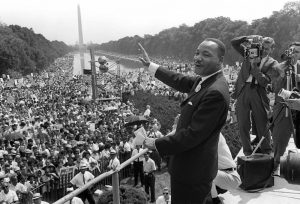
44 States Set to Remove Critical Race Theory
Forty four states have introduced bills or taken other steps that would restrict teaching critical race theory, or limit how teachers can discuss racism and sexism. Critical race theory is an academic and legal framework that recognizes systemic racism in the United States. It challenges the idea that racism is abnormal or that it’s just a result of individual bias.
In late January, the Department of Defense issued a memo removing the recognition of history months, such as Black History Month, Women’s History Month, and Pride Month, from its official observances, claiming such months played a divisive role in American society.
But we in the National Lawyers Guild still strongly believe such months can play a vital role in educating our diverse population on matters often given little or no attention in our lives or in our public schools around the nation.
So as far as we are concerned, this month, the month of February is still Black History Month. And, we’ve invited two guests who believe as we do to join us here on The Lawyers Guild Show today to discuss racism in America, both historic and present-day. That, in turn, means we will be examining critical race theory and consider why White America has so much fear of it being taught in our public schools.
Guests – Sharon Kyle and Dick Price, respectively publisher and editor of the LA Progressive, a daily on-line magazine widely read throughout the greater Los Angeles area, and beyond. Sharon Klye is Black, Dick Price, who happens to be her husband, is White.

———————————
Civil Liberties, Civil Rights, Gaza, Human Rights, Illegal Immigration
Podcast: Play in new window | Download
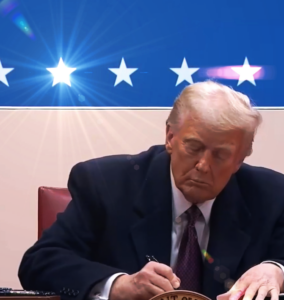

Trump Executive Orders Erasing Protections For Underclass
This is the first week of Black History Month, and we at the Law and Disorder show are eager to celebrate it. But that’s not what’s happening in the Trump administration. The Defense Department under the headline “Identity Months Dead at DoD” has eliminated various Heritage Months, including Black History Month. Meanwhile, the Defense Intelligence Agency has “paused” the recognition of Black History Month.
Even more alarming is Trump’s Executive Order eliminating the use of D.E.I., that is “diversity, equity and inclusion”, as factors to be considered by all federal agencies when hiring their employees. Trump claims the elimination of DEI will result in America becoming a “colorblind and merit-based society.” However, DEI programs do not hire less qualified applicants for jobs, they simply require governmental agencies to seek out well-qualified minority and women candidates for all job openings. That is, to remove any discriminatory barriers that result in hiring fewer well-qualified women and minorities, and the disabled, in their work force. Margareet Huang, the Southern Poverty Law Center’s president and chief executive got it right when she said, “His (Trump’s) attacks on diversity, equity and inclusion—are just a sanitized substitute for the racist comments that can no longer be spoken openly.”
Meanwhile, and closely related to Trump’s attack on DEI, are his multifaceted attacks on immigrants and in particular those who join in public protests against his policies, such as his policies on Israel and Palestine.
For many years, and especially after October 7, 2023, as a way to stifle demands for Palestinian human rights and sovereignty, there has been a concerted effort to conflate criticism of the Israeli government with anti-Semitism. Now Trump has upped the ante. On January 29, he pledged to deport non-citizen college students, and others, who take part in pro-Palestinian protests, and promising “immediate action” by his Justice Department to prosecute such protesters. He issued a warning to all the resident immigrants who join in what he called “the pro-jihadist protests,” warning that “we will find you, and we will deport you.” He threatened to cancel the foreign student visas of what he labeled “Hamas sympathizers on college campuses, which have been infested with radicalism like never before.”
To implement these sweeping threats, Trump issued an Executive Order titled “Additional Measures to Combat Anti-Semitism.” Among other things, the order reaffirms Executive Order 13899 that Trump issued on December 11, 2019, during his first term. It required all executive departments and agencies charged with enforcing anti-discrimination laws to consider the highly controversial “working definition” of anti-Semitism adopted in 2016 by the International Holocaust Remembrance Alliance (IHRA), including eleven “Examples of Anti-Semitism.”
On May 1, 2024, the House of Representatives on a 320-91 bipartisan vote, passed the Antisemitism Awareness Act. It would enshrine the very same flawed IHRA “working definition” in federal law. It now goes before the Senate. On January 21, without even waiting for the Act to become law, Harvard University set a dangerous precedent by agreeing to adopt the IHRA definition as part of a settlement of two federal lawsuits that had accused the school of failing to do enough to prevent antisemitic discrimination.
Guest – Stephen Rohde is a civil rights activist, author, and constitutional scholar. He currently serves as chair of the Interfaith Communities United for Justice and Peace (aka ICUJP), and he is also a past President of the ACLU Foundation of Southern California, and past Chair of Death Penalty Focus and Bend the Arc: A Jewish Partnership for Justice.

—————————————-
Civil Liberties, Civil Rights, FBI Intrusion, Human Rights, Political Prisoner, Racist Police Violence, Right To Dissent, Surveillance, Torture, Truth to Power
Podcast: Play in new window | Download
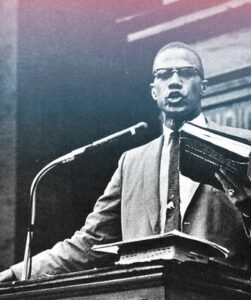
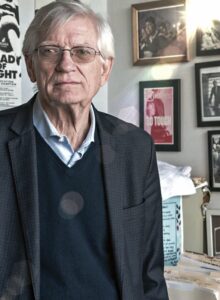
Malcolm X Shabazz et al. v. USA
A groundbreaking legal case seeks justice for the family of most iconic civil rights leaders, Malcolm X. In an unprecedented lawsuit filed by his daughters, the Shabazz family is challenging the U.S. government, the City of New York, and several high-ranking law enforcement agencies. At the heart of the case is the claim that state actors, including the FBI and NYPD, played an active role in the assassination of Malcolm X on February 22, 1965, and that this involvement has been systematically covered up for decades.
This suit, Malcolm X Shabazz et al. v. USA, not only seeks justice for the wrongful death of Malcolm X but aims to hold the government accountable for its complicity in the assassination. The case draws on newly uncovered evidence that links federal agencies to the events surrounding Malcolm X’s death, as well as the subsequent framing and wrongful conviction of two men who were exonerated in 2021.
The legal team behind this case includes civil rights attorneys Benjamin Crump and G. Flint Taylor, and if successful, their argument could rewrite the historical narrative surrounding one of America’s tragic and significant moments. At the core of this case is the question: How deep was the state’s involvement in silencing Malcolm X? Was the assassination part of a coordinated campaign by law enforcement agencies determined to prevent the rise of powerful Black leaders? The lawsuit raises profound questions about the government’s role in suppressing movements for racial justice and civil rights, both in the past and in the present.
Guest – Flint Taylor of the Peoples Law Office. Flint represented the family of Fred Hampton and revealed that the FBI and Chicago Police Department murdered him in 1969. Flint is an editor of the Police Misconduct Law Reporter and is author of The Torture Machine: Racism And Police Violence In Chicago.
—-
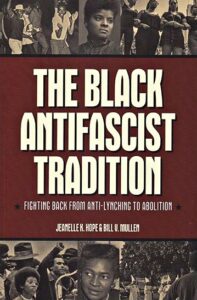
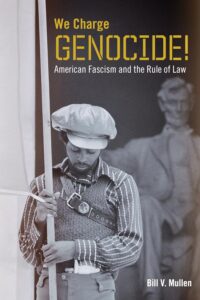
A History Of Anti-Black Racism
National chauvinism and racism are essential features of fascism. The practice of white racism in the United States during the Jim Crow era was something that Hitler’s party in Germany studied and emulated. This kind of anti-black racism went on in the United States from shortly after the Civil War up until the 1960s. It has never really gone away as the mass mobilizations of the Black Lives Matter movement has recently demonstrated. This Black resistance, this fight back, will be a central aspect of anti-fascist activity in the future.
Guest – Bill Mullen is professor emeritus of American studies at Purdue University and the co-founder of The Campus Anti-fascist Network. He’s also co-author of The Black Antifascist Tradition and his new book published last month We Charge Genocide: American Ashes and the Rule of Law.

——————————
Civil Liberties, Civil Rights, Gaza, genocide, Human Rights, Targeting Muslims, U.S. Militarism, Violations of U.S. and International Law, War Resister
Podcast: Play in new window | Download
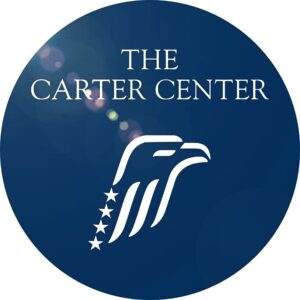
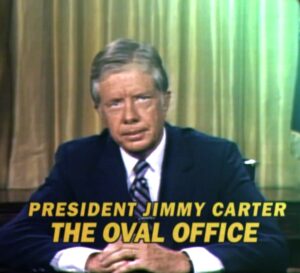
Remembering The Legacy of Jimmy Carter
Jimmy Carter passed away on December 29, 2024, at the age of 100. His legacy in human rights has left an indelible mark on global diplomacy. Elected in 1977 as the 39th President of the United States, Carter made human rights a central theme of his administration. He believed that as a global power, the US had a responsibility to champion freedom, dignity, and justice for all people, regardless of nationality or political system. This vision led to the introduction of policies aimed at addressing both the internal injustices within the U.S. and the broader human rights violations occurring around the world.
One of Carter’s most significant achievements in this realm was his focus on condemning authoritarian regimes and promoting democratic movements. His administration applied pressure on governments, particularly in Latin America, Asia, and Africa, to uphold human rights standards, often linking U.S. foreign aid and diplomatic relations to a country’s record on human rights. Though controversial at times—especially in relation to U.S. alliances with regimes like those in Iran and Egypt—Carter’s commitment to human rights was revolutionary in its directness.
Beyond policy, Carter also helped create lasting institutions that would carry forward his vision. The Carter Center, founded in 1982, became a beacon for promoting democracy, advancing health, and improving human rights globally. Through the Center, Carter personally monitored elections, mediated peace talks, and worked to eliminate diseases that disproportionately affected the world’s most vulnerable populations. After leaving office, Carter’s work as a human rights advocate set a new precedent for U.S. foreign policy, showing that human rights can—and should—be a priority in shaping international relations and peace efforts.
Guest – Mischa Geracoulis is a journalist and critical media literacy expert. Mischa is the Curriculum Development Coordinator at Project Censored, and serves on the editorial board of the Censored Press and The Markaz Review. She writes about journalistic ethics and standards, press and academic freedoms, identity and culture, and the protracted disinformation campaign against the Armenian Genocide. She is author of the forthcoming book to be published by Routledge, Media Framing and the Destruction of Cultural Heritage.
—-
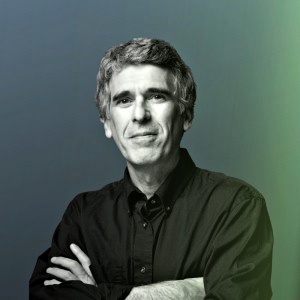
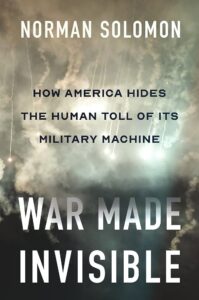
War Made Invisible: How America Hides the Human Toll of its Military Machine
The United States is engaged in constant, if often invisible, wars. Or, if not invisible, at least not accurately and fully reported on in the corporate media. Thereby leaving the people of the United States far from fully informed as to what and where U.S. military troops are stationed or engaged in military action. For example, while there has been a great deal of media coverage of the U.S. supported Israeli war in Palestine, one would have needed to pay extra close attention to that coverage to know that the U.S., even before that war began, had 40,000 U.S. troops stationed in the area. Or that the Biden Administration has just recently sent at least 1,500 more to join them. And how many of us know that late last year retired Israeli Major General Yitzhak Brick, said that, and I quote: “All of our missiles, the ammunition, the precision-guided bombs, all the airplanes and bombs, it’s all from the U.S. Everyone understands that we (Israel) can’t fight this war without the United States.
So last year, Norman Solomon, our guest today, wrote a much noted and much-admired book titled, War Made Invisible: How America Hides the Human Toll of its Military Machine. And that book has just been reissued with an up-dated afterword about the Gaza War, by the author. Naomi Klein, best-selling author of The Shock Doctrine, says the book is “A Staggeringly Important Intervention”. Noam Chomsky, says Solomon’s book is a “gripping and painful study of the mechanisms behind our invisible, but perpetual, national state of war.”
Guest – Norman Solomon is the co-founder of RootsAction.org and Executive Director of the Institute for Public Accuracy, and is, in fact, the author or co-author, of 12 books, most touching on today’s topic in either close or tangential ways. His books include War Made Easy: How Presidents and Pundits Keep Spinning Us to Death.

—————————





















